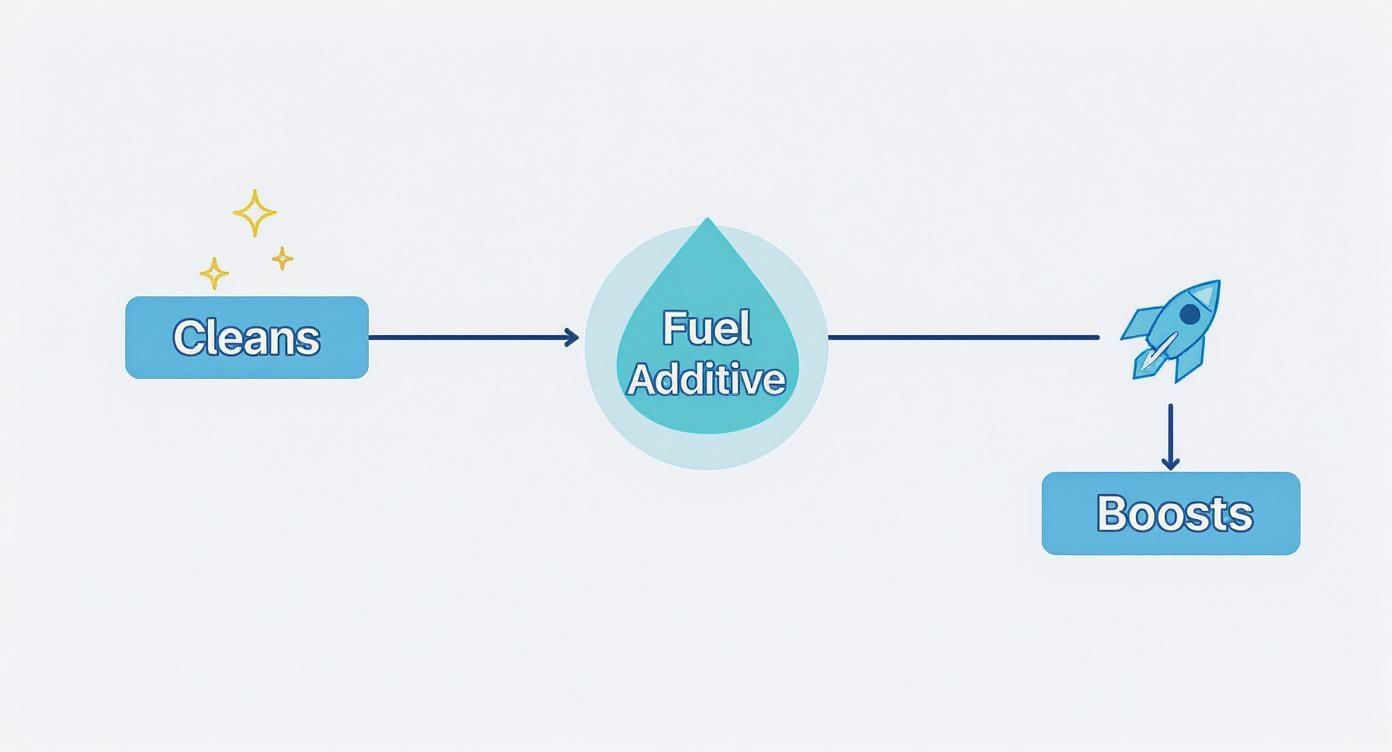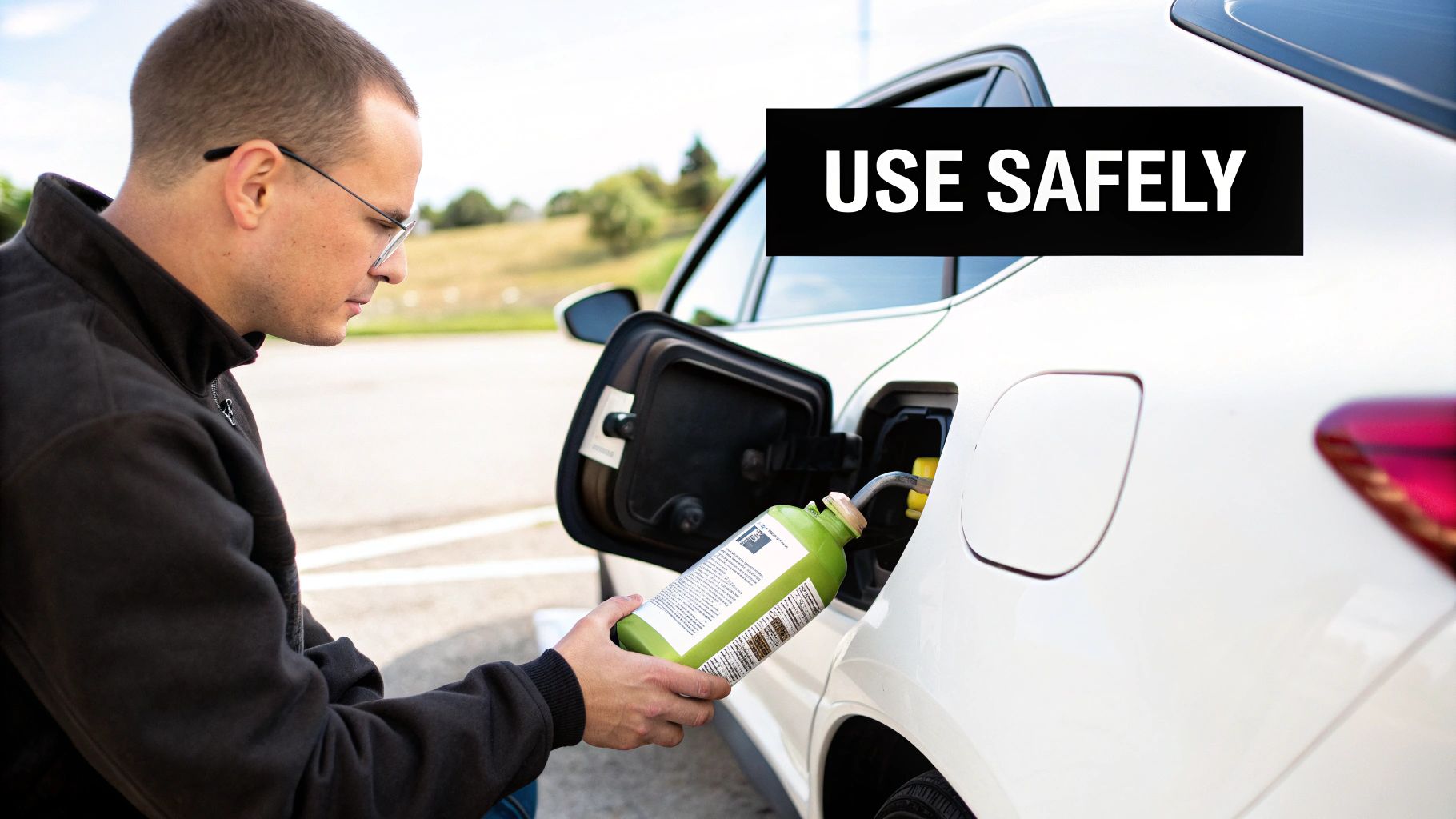What Are Fuel Additives and How Do They Work
- Misfuelled Car Fixer

- Nov 5, 2025
- 13 min read
Think of fuel additives as a health supplement for your car's engine. Just like you might take a vitamin to stay on top of your game, an additive is a chemical blend you mix into your petrol or diesel to improve its performance and protect your engine's inner workings.
Their main job is to clean, protect, and enhance your vehicle's fuel system.
So, What Exactly Do Fuel Additives Do?
The fuel you get at the pump is a good starting point—it provides the energy your car needs to run. But over thousands of miles, that basic fuel might not be enough to keep everything in peak condition. That's where additives come in. They’re specially formulated to tackle specific problems that crop up over time.
Modern engines, particularly the ones we drive here in the UK, are incredibly sophisticated. They run at higher pressures with tighter tolerances than ever before, which makes them more susceptible to things like carbon build-up and poor fuel quality. Additives help bridge that gap, optimising how the fuel behaves inside your engine.
Why Are They So Common Now?
You’re seeing more of these products on the shelves for a few good reasons. As engine technology has advanced, the standard stuff from the pump can't always prevent common issues on its own.
Here’s a simple way to think about what they do:
Cleaning: Think of detergent additives as a deep clean for your engine's insides. They get to work dissolving nasty carbon deposits that can clog up fuel injectors and valves.
Protecting: Corrosion inhibitors act like a protective barrier for the metal parts of your fuel system, stopping rust and decay caused by inevitable moisture.
Boosting: Performance enhancers, like octane boosters for petrol or cetane boosters for diesel, help the fuel burn more completely and efficiently. This can bring back lost power and make your car feel more responsive.
It's this focus on proactive engine care that has driven the massive growth in the fuel additives market. It was valued at around USD 9.15 billion in 2023 and is expected to climb to USD 15.30 billion by 2032. This isn’t just some fad; it’s a global shift towards better engine maintenance, improved fuel economy, and meeting tougher emissions standards. For a deeper dive into these market trends, the analysis from Fortune Business Insights is quite revealing.
Remember, a fuel additive isn’t a magic potion for a broken engine. It’s a tool for preventative maintenance. Using them consistently can keep your engine running as it should, help you sidestep expensive repairs, and even save a bit of money on fuel thanks to better efficiency.
Exploring the Different Types of Fuel Additives
So, we know what fuel additives are, but what do they actually do? It helps to think of them not as a single cure-all but as a specialist's toolkit for your engine. You wouldn't use a wrench to hammer a nail, and similarly, different additives are designed for very specific jobs inside your fuel system.
This handy breakdown shows how most additives fall into three main categories.

As you can see, it all boils down to cleaning out the bad stuff, protecting vital parts, and helping your fuel do its job better. Let's look at each of these roles a little closer.
Additives That Clean and Restore
The most popular additives on the shelf are detergents, also known as fuel system cleaners. Think of them as a power-wash for the inside of your engine. Over thousands of miles, tiny bits of unburnt fuel and impurities cook themselves into hard carbon deposits on crucial components like fuel injectors and intake valves.
This gunk can seriously choke your engine's performance by messing with the fuel spray pattern. A quality detergent additive gets to work dissolving these deposits, which are then harmlessly burned off during combustion. The end result is a cleaner engine that often regains lost power and improves its fuel economy. Using them periodically can stop that build-up from happening in the first place.
Additives That Boost Performance
This category is all about getting the best bang from every drop of fuel, and there are two main players – one for petrol and one for diesel.
Octane Boosters: In petrol engines, the octane rating tells you how much the fuel can be compressed before it ignites on its own. If it ignites too early, you get that tell-tale "knocking" or "pinging" sound. An octane booster raises this rating, making the fuel more stable under pressure. This allows a high-performance engine to run as it should, delivering smoother power.
Cetane Boosters: For diesel engines, the key metric is cetane. This measures how quickly the fuel ignites once injected into the cylinder. A higher cetane number means a faster, more complete burn. The payoff? Smoother and quieter running, easier starts in the cold, and fewer nasty emissions.
It's important to remember that these boosters don't magically create horsepower in an ordinary car. What they do is enable the engine to perform at its peak, especially if you've been forced to fill up with lower-quality fuel than your manufacturer recommends.
Additives That Protect and Preserve
Your fuel system faces a constant battle against moisture and the simple effects of time. This is where protective additives step in to act as your engine's bodyguards.
Corrosion inhibitors are a great example. They work by creating an ultra-thin, protective film on the metal surfaces of your fuel tank and lines. This microscopic shield stops water and condensation from causing rust and corrosion, which can lead to blocked filters and expensive repairs.
Fuel stabilisers are a must-have for any vehicle that sits for long periods, like a classic car tucked away for winter or a motorbike that only sees sunny weekends. Petrol goes stale surprisingly quickly, breaking down into a sticky varnish that clogs up fuel systems. A good stabiliser stops this process cold, keeping fuel fresh for months on end.
Finally, biocides are a lifesaver for diesel owners, particularly when tackling water contamination. When water gets into a diesel tank, it creates the perfect breeding ground for microbes – the infamous "diesel bug." This creates a nasty sludge that can wreck your fuel system. If you suspect you have this problem, you can learn all about the signs and solutions for water in diesel fuel in our dedicated guide.
Weighing the Benefits Against the Risks
So, are fuel additives a genuine maintenance tool or just clever marketing in a bottle? The truth, as it often does, lies somewhere in between. When you use the right product for the right reason, the advantages are clear and tangible. But get it wrong, and you could create problems you never had before.
The main benefit is really about restoring and maintaining your engine’s health. Think of a quality fuel system cleaner as a deep-clean for its internal plumbing. By clearing out stubborn carbon deposits from fuel injectors and intake valves, it helps the engine breathe easier and burn fuel much more effectively.
This cleaning action triggers a few positive knock-on effects:
Restored Performance: A clean fuel system often brings back lost power and responsiveness. Your car just feels sharper and more alive.
Improved Fuel Economy: When your injectors can spray fuel in a fine, perfect mist rather than a messy dribble, combustion is far more complete. That means you squeeze more miles out of every litre.
Lower Emissions: Better combustion means a cleaner burn, which cuts down on harmful pollutants like soot and particulate matter. It’s a simple way to help your vehicle run cleaner.
Over the long haul, this kind of preventative care can genuinely extend the life of critical engine parts, potentially saving you from some eye-watering repair bills down the road. It’s all about keeping your engine running the way the manufacturer intended.
Understanding the Potential Downsides
Now, for the other side of the coin. It's crucial to know that fuel additives aren't risk-free, especially if you choose a poor-quality product or ignore the instructions. The single biggest mistake people make is assuming "more is better."
Overdosing an additive can easily do more harm than good. Too much of a concentrated chemical can lead to new deposits forming inside the combustion chamber or even damage delicate fuel system parts like seals, O-rings, and sensors.
Another major risk is simply using the wrong type of additive. Pouring a diesel anti-gel formula into a petrol tank, for instance, is a recipe for disaster. These products are highly specialised, and an incompatible one can completely throw off your fuel's chemistry and lead to serious engine trouble.
The golden rule is simple: Always read the label and follow the instructions precisely. A reputable product will have clear dosing information and tell you exactly which fuel types and engines it’s designed for.
Finally, be sceptical of cheap, generic products that make unbelievable claims. The market is flooded with "mechanic-in-a-bottle" solutions that are little more than harsh solvents or ineffective chemicals. At best they do nothing; at worst they can cause lasting damage. Sticking to well-reviewed, established brands is always your safest bet. Making an informed choice lets you reap all the rewards without any of the risks.
How to Choose and Use Additives Safely

Walking into an auto parts shop and seeing a wall of fuel additives can be a bit intimidating. With so many choices, where do you even begin? The key is to start with a clear goal in mind.
Think about what you're trying to achieve. Are you dealing with a specific issue, like a stuttering engine or a bit of rough idling? Or are you just looking to give your high-mileage engine some preventative care? The answer will point you straight to the right bottle.
For example, if your older petrol car just doesn't feel as lively as it used to, a good fuel system cleaner that contains polyetheramine (PEA) is your best bet for breaking down those stubborn carbon deposits. On the other hand, if you’re a diesel driver dreading a harsh winter, an anti-gel additive is a must-have to keep your fuel flowing freely. And of course, always double-check that you're buying the right additive for your fuel type—a diesel formula in a petrol engine is a recipe for disaster.
Mastering the Correct Application
Once you've got the right product, using it properly is everything. This is where a lot of people go wrong. Adding too little is just a waste of money, as it won't be concentrated enough to do its job. Go the other way and add too much, and you could risk damaging sensitive parts like seals and sensors in your fuel system.
To get it right every single time, just follow these three simple steps:
Read the Label: First things first, check the instructions for the treatment ratio. The bottle will clearly state how many millilitres to use for each litre of fuel (e.g., 1ml per 1 litre).
Add Before Fuelling: Pour the measured amount of additive straight into your fuel tank before you start pumping.
Fill 'er Up: As you fill the tank, the incoming fuel will churn and mix with the additive, making sure it's spread evenly throughout the tank for the best results.
Crucial Tip: Don’t just guess the amount. The measurement lines on the side of the bottle are there for a reason, so use them! Precision is what gets you the benefits without any of the risks.
Checking Vehicle Compatibility and Your Warranty
Before you pour anything new into your fuel tank, it’s always a good idea to spare a thought for your car's warranty. While high-quality additives are designed to be safe for almost all modern engines, a quick look at your vehicle's handbook is never a bad move. Some carmakers have their own specific recommendations, or they might even warn against using certain chemicals.
To stay on the safe side, stick with established, reputable brands. These companies have a lot more to lose from a faulty product, so they invest heavily in research and testing. The UK fuel additives market is quite competitive—as of 2023, its Herfindahl-Hirschman Index (HHI) was 2603, which points to a healthy market with several big, reliable players. You can find more details in this UK fuel additives market report on 6wresearch.com.
Choosing a well-known brand gives you confidence in the quality of what you're buying and provides that extra peace of mind when it comes to your vehicle's warranty.
Separating Fuel Additive Fact from Fiction

The world of fuel additives is absolutely swimming with bold claims, tall tales, and persistent myths. It can be a real headache trying to work out what’s a genuine benefit and what’s just clever marketing. Let's cut through the noise and get straight to the facts.
One of the biggest misconceptions we hear all the time is that using premium fuels makes aftermarket additives totally pointless. Now, it's true that fuels like Shell V-Power or BP Ultimate already contain a much better package of detergents than standard unleaded or diesel. They're great for general, preventative maintenance.
But a specialised, concentrated fuel system cleaner is a different tool for a different job. It's designed to attack a specific, existing problem, like heavily coked-up injectors on an older, high-mileage engine.
Think of it this way: using premium fuel is like brushing your teeth every day. A dedicated additive is like going to the dental hygienist for a proper deep clean when things have started to build up.
Common Myths Debunked
Many drivers get caught out by these common myths, which at best lead to wasted money and at worst can cause actual harm. Knowing the truth helps you make smarter choices for your car.
Myth 1: More is always better. It's tempting to think that doubling the dose will give you double the results, but it absolutely won't. In reality, overdosing can throw the fuel's delicate chemical balance out of whack, potentially damaging sensitive components like O2 sensors or rubber seals. Always, always stick to the manufacturer's recommended ratio.
Myth 2: Additives can fix broken parts. This one is critical. A fuel additive can do a fantastic job of cleaning a dirty injector, but it cannot repair a cracked fuel line, mend a faulty fuel pump, or fix a worn-out engine component. Additives are for maintenance and restoration, not miracle cures.
Additives are designed to get a system back to its optimal working condition; they can’t perform mechanical surgery. Believing they can fix a broken engine is a costly fantasy.
Myth 3: All additives are basically the same. This simply isn't true. A cheap, generic bottle from the bargain bin often contains little more than basic solvents. In contrast, a high-quality formula will use advanced, purpose-built compounds like polyetheramine (PEA) for effective and safe cleaning.
It’s also vital not to get your additives mixed up. Products like AdBlue have a completely different purpose. Putting the wrong fluid in the wrong tank can lead to catastrophic damage. For a deep dive on this, read our guide on what happens when you put AdBlue in your diesel tank and what your next steps should be.
By understanding what these products can—and, more importantly, can't—do, you can use them as intended to keep your engine running smoothly for years to come.
When You Should Call a Professional Instead
While a good fuel additive can work wonders for maintenance, it's crucial to know its limits. Think of it like a vitamin supplement for your car – it helps keep a healthy system in top condition, but it can’t perform surgery. They're all about optimisation, not a miracle cure for a mechanical breakdown.
Additives are completely out of their depth when faced with physical damage. No additive can fix a failed fuel pump, patch up a cracked fuel line, or undo years of serious wear and tear inside your engine. If you're hearing strange grinding noises, seeing dashboard warning lights that won’t go away, or feeling a sudden drop in power, a bottle of additive isn't the solution. Those are clear signs that a part has given up, and you need a mechanic to take a look.
Misfuelling Is a Mechanical Emergency
There's one scenario where additives are completely useless, and that's misfuelling. Putting petrol in a diesel car (or the other way around) is a chemical catastrophe that needs immediate, professional help.
An additive cannot reverse a misfuel. If you run the engine with the wrong fuel, you're pumping a destructive solvent through the system. This can wreck injectors, pumps, and seals, leading to repair bills that run into the thousands.
If you've misfuelled, do not start the engine. Your only safe move is to call an emergency fuel drain service like Misfuelled Car Fixer. A specialist needs to drain the contaminated fuel, flush the entire system, and make sure your car is safe to drive.
Trying to sort it out yourself can be risky. To get a better idea of what's involved, have a look at our practical guide to cleaning petrol tanks, which really shows how complex the job can be.
Common Questions About Fuel Additives
Even after getting the facts straight, it's normal to have a few questions rattling around. Let's tackle some of the most common queries we hear from UK drivers, so you can decide what’s right for your car with total confidence.
How Often Should I Use a Fuel Additive?
There's no single answer here—it really boils down to what the additive is designed to do. Think of a powerful fuel system cleaner; you'd typically use that every 3,000 miles or so, maybe alongside your oil change, to give the system a proper deep clean and get rid of stubborn deposits.
On the other hand, something like a fuel stabiliser is for a completely different job. If you’re putting a classic car away for the winter, you'd add it every time you top up the tank before storage. The same goes for diesel anti-gel additives, which you’d only need when the temperature starts to plummet.
The best advice is always the simplest: read the instructions on the bottle. The manufacturer knows their formula best and will give you the right dosing and frequency for the results you’re after.
Can Fuel Additives Damage My Engine or Void a Warranty?
This is a big concern for many drivers, but the reality is that high-quality additives are perfectly safe when you use them as directed. The problems almost always stem from human error—not the product itself. The biggest risks are pouring in far too much, or worse, using an additive made for the wrong fuel type, like putting a diesel treatment into a petrol car.
To keep your warranty safe and sound, stick to well-known, reputable brands. These companies pour money into research and testing to ensure their products are effective and safe. It's also worth a quick flick through your car's handbook to see if the manufacturer has any specific recommendations or warnings.
Are Additives Worth It for an Older, High-Mileage Car?
Absolutely. In fact, older cars with a lot of miles on the clock often get the biggest boost from them. Over tens of thousands of miles, it's inevitable that carbon deposits and gunk will build up in the injectors, on the valves, and throughout the fuel system. This build-up slowly strangles performance and drinks more fuel.
A good-quality additive, especially one designed for high-mileage vehicles, can get to work dissolving that grime. You can often feel the difference in restored power, a smoother idle, and better fuel economy. It’s one of the most cost-effective ways to wind back the clock and give an older engine a new lease of life.
If you've put the wrong fuel in your car, an additive won't help. This is a mechanical emergency that requires a professional fuel drain. Don't start the engine and call Misfuelled Car Fixer immediately on our 24/7 hotline. We provide a rapid, on-site mobile fuel drain service across Suffolk and beyond to get you safely back on the road. Find out more at https://www.misfuelledcarfixer-suffolk.co.uk.



Comments